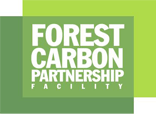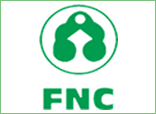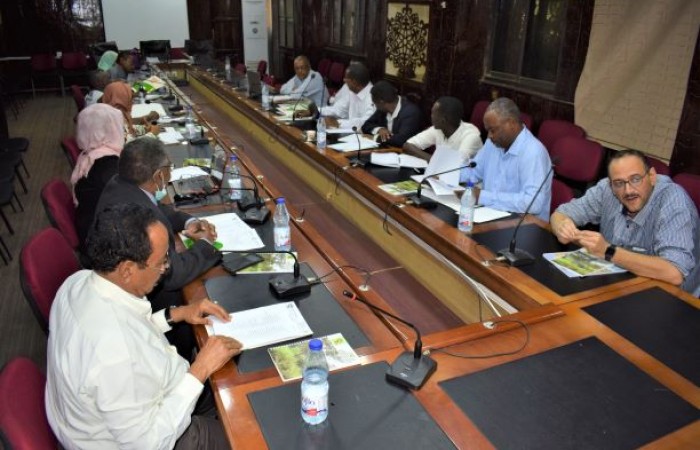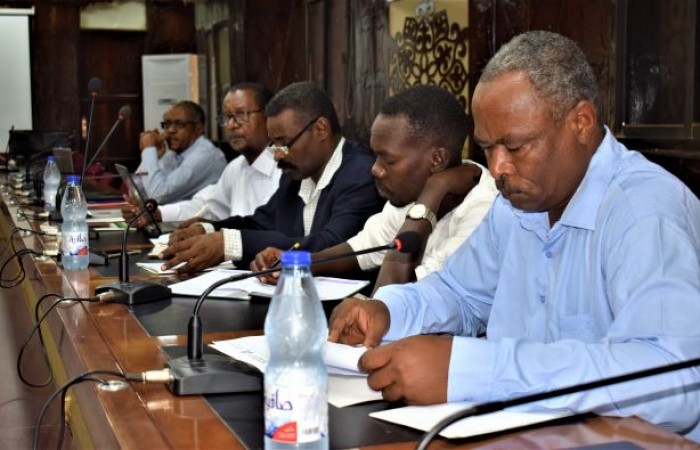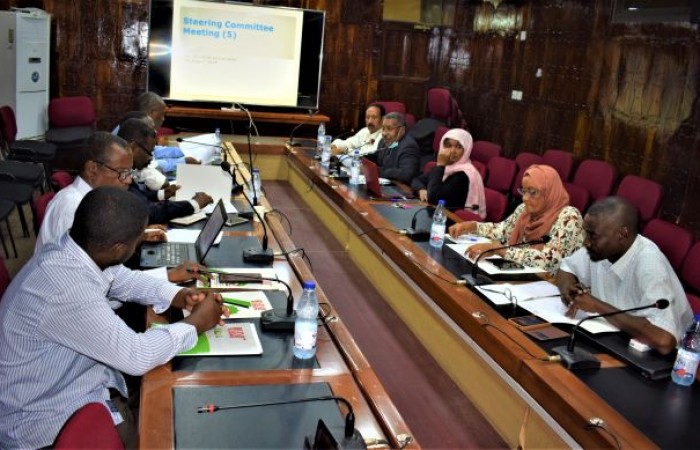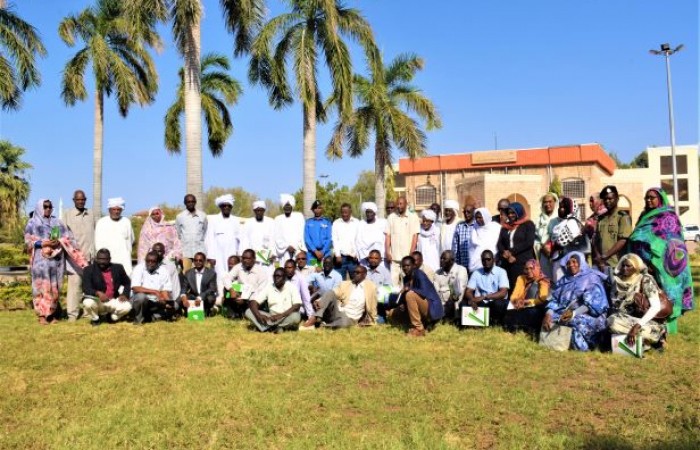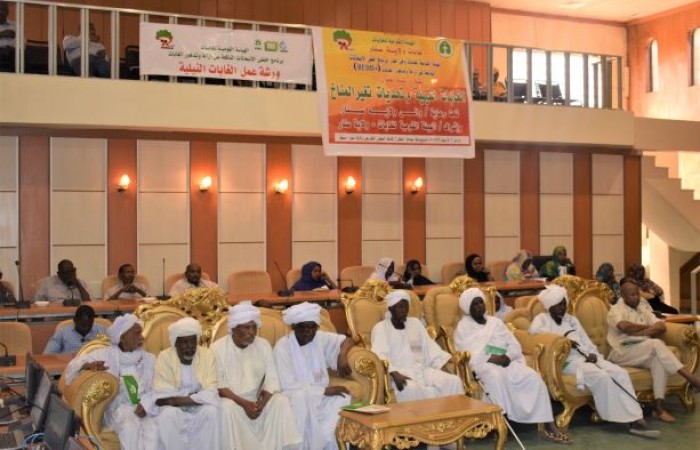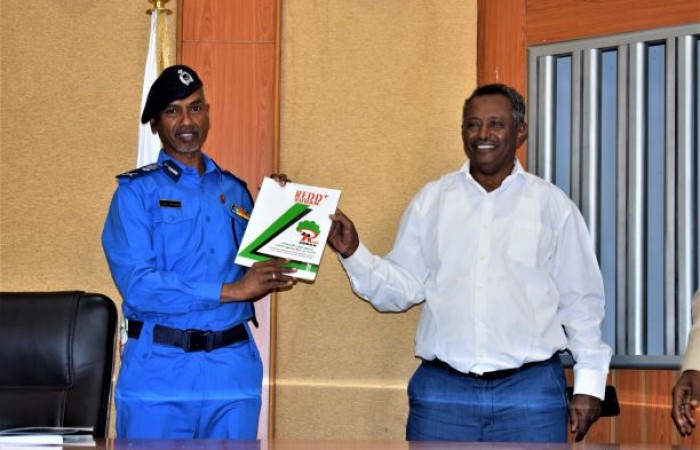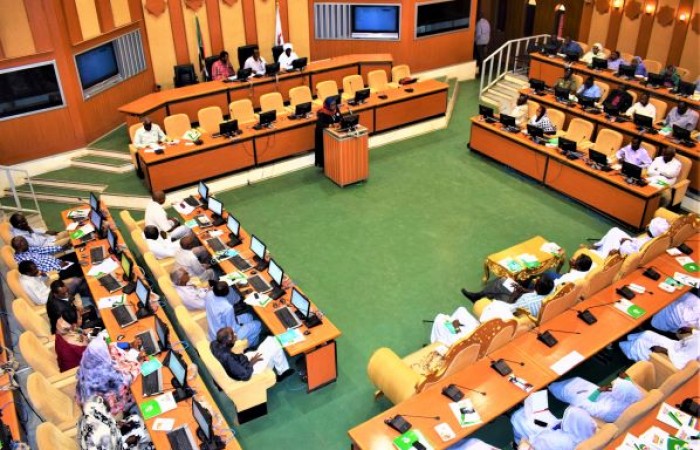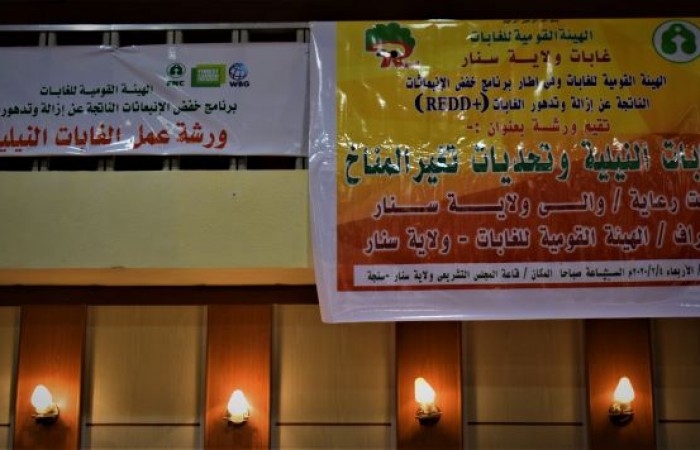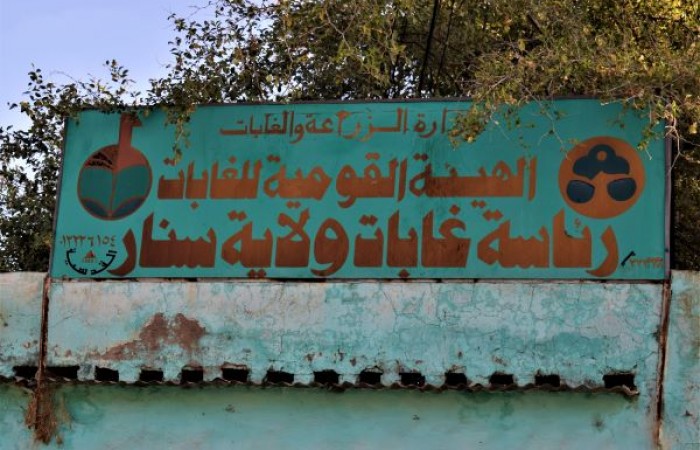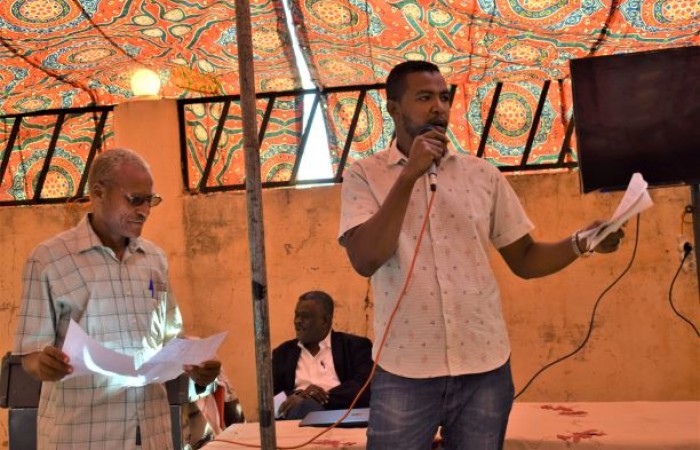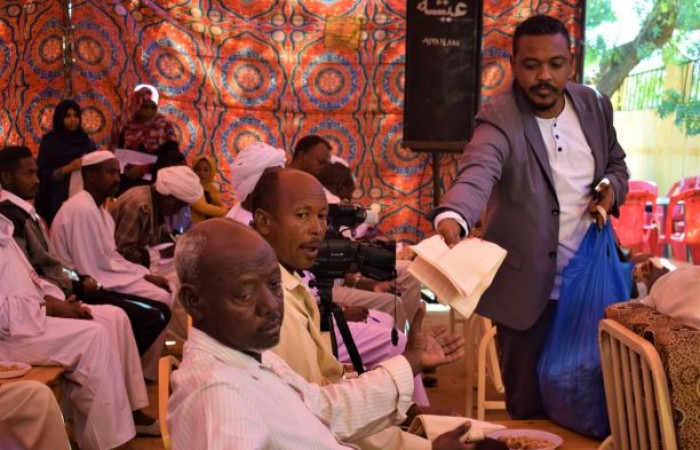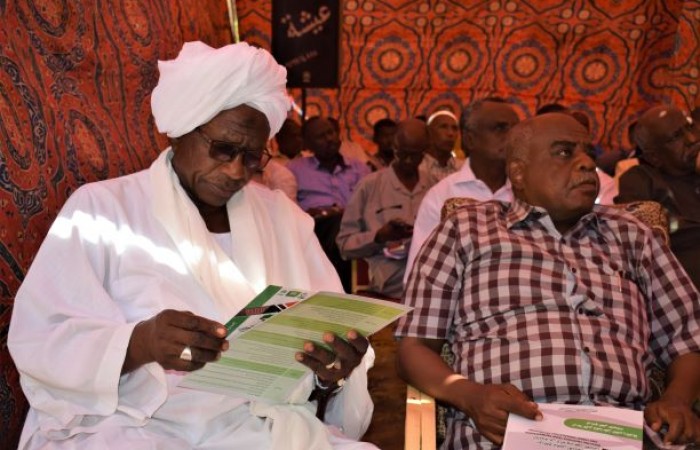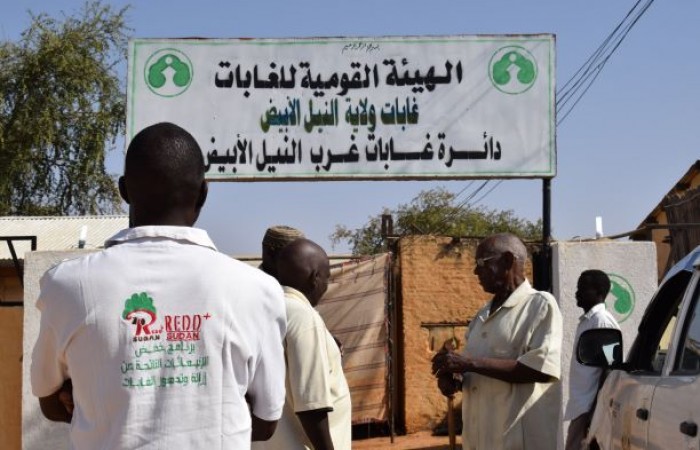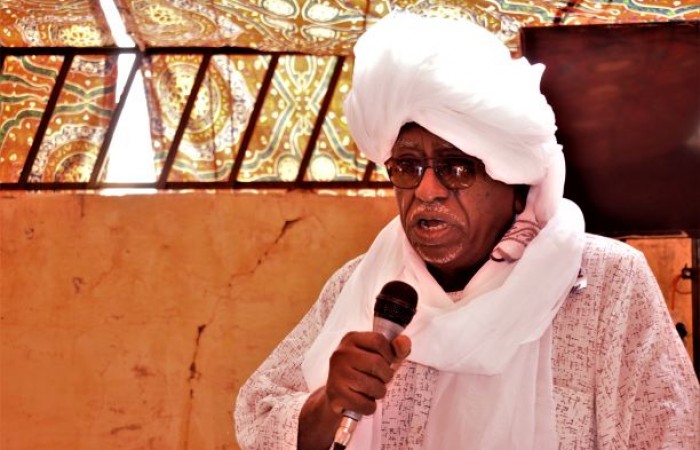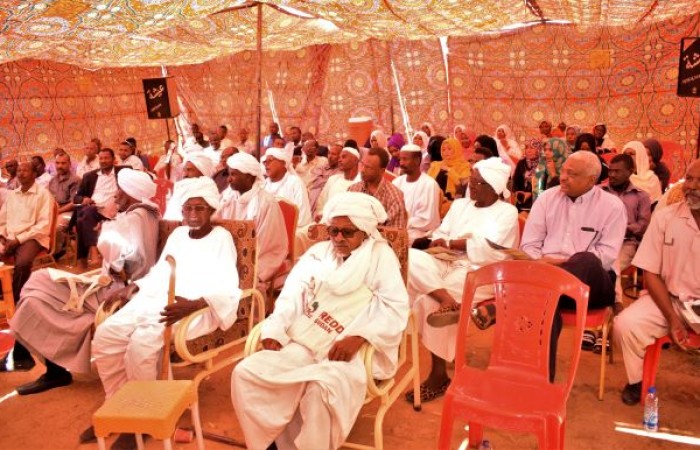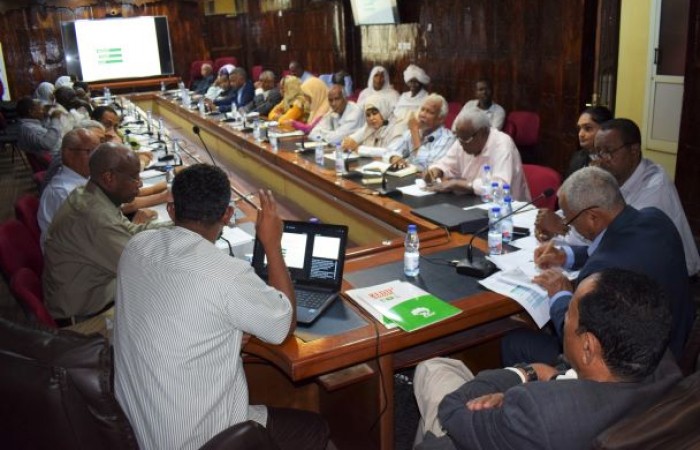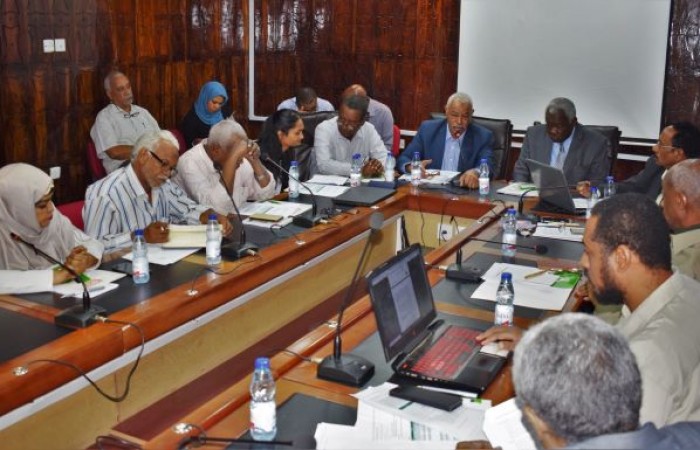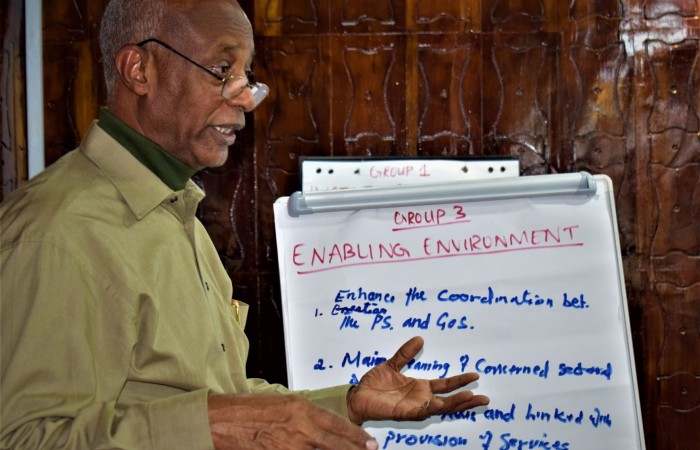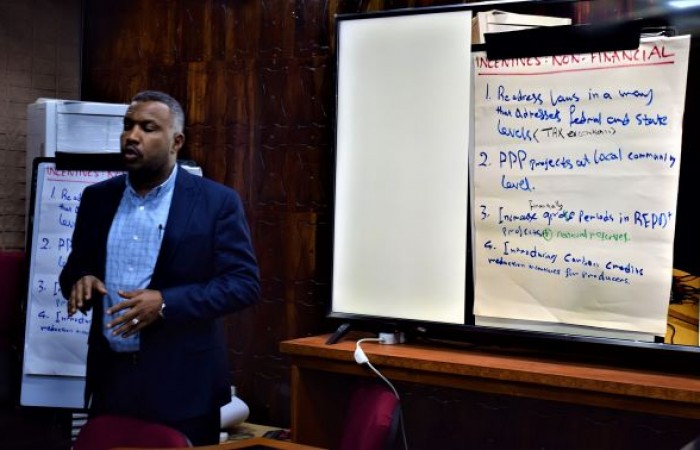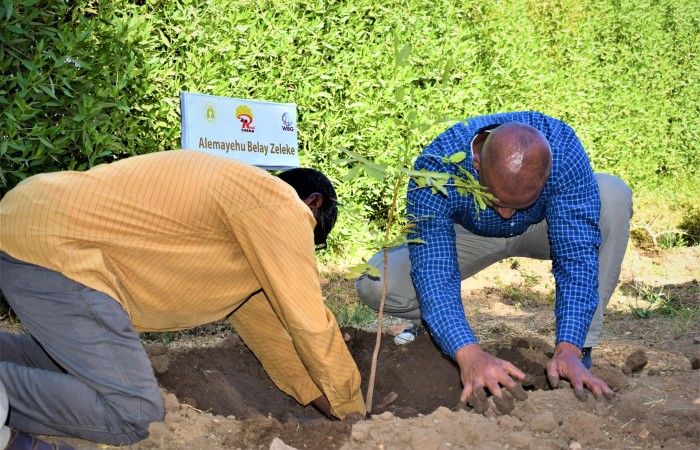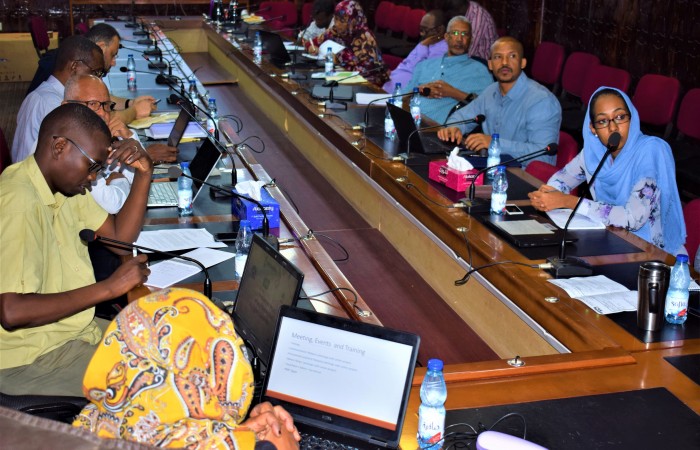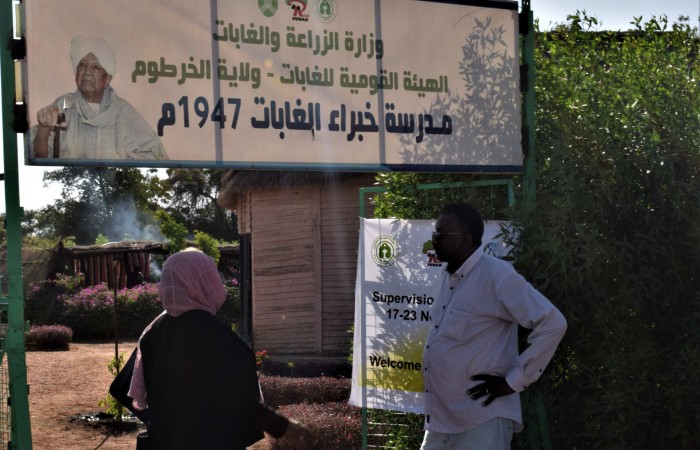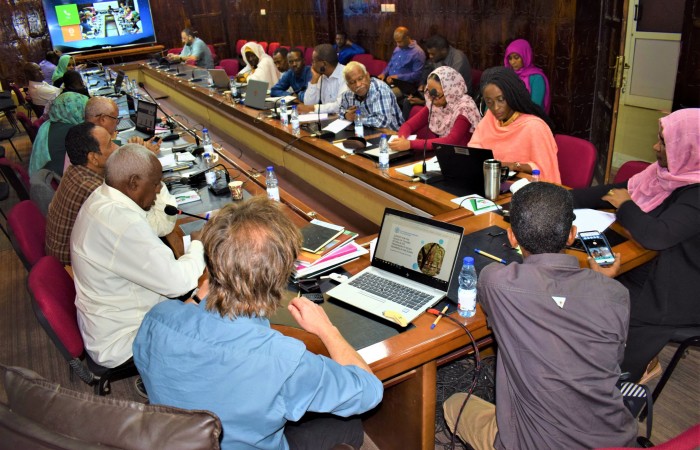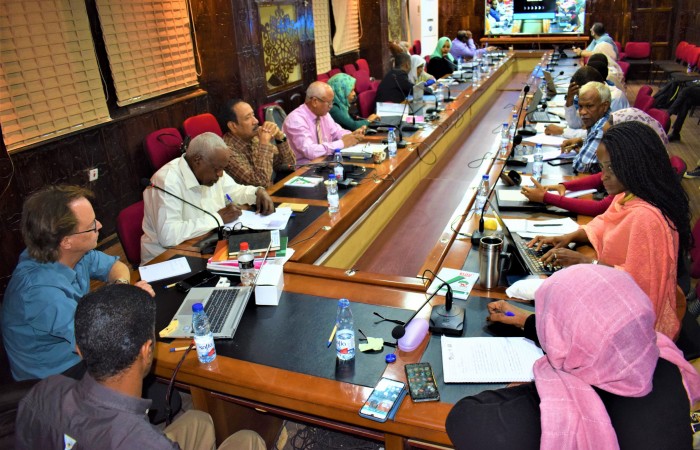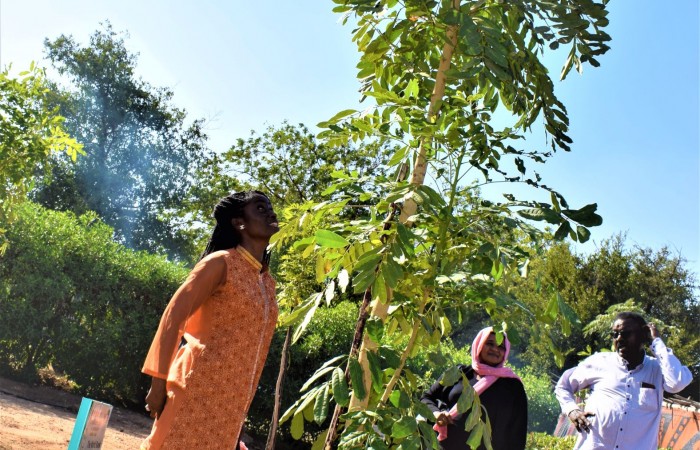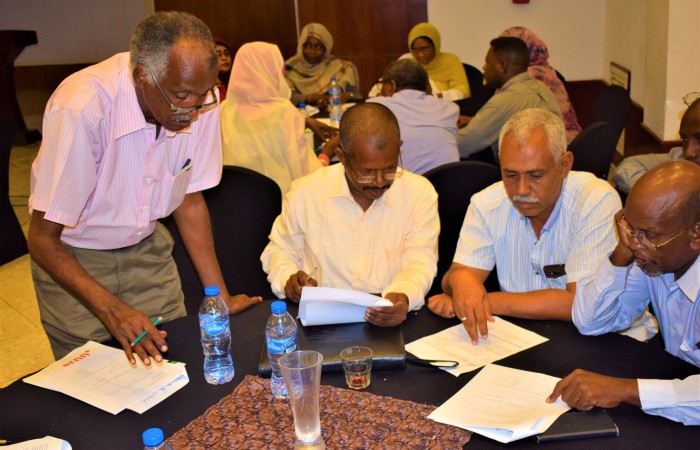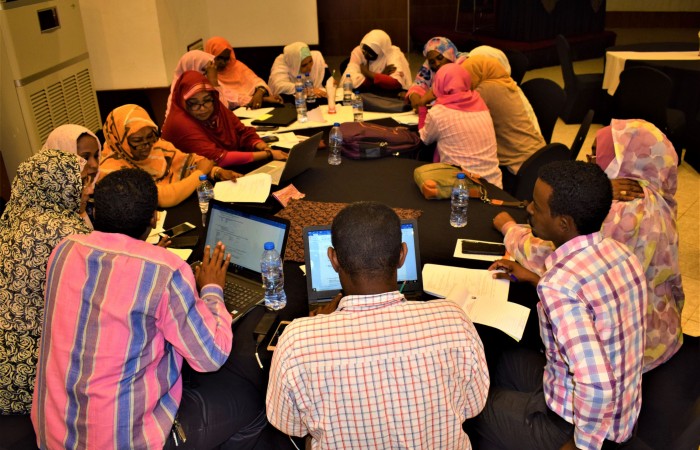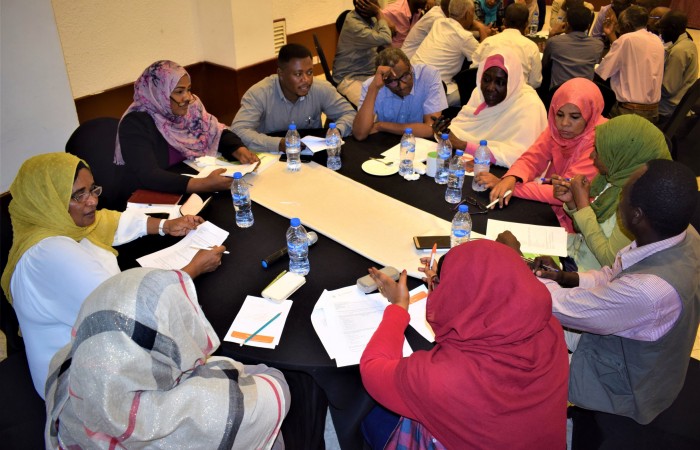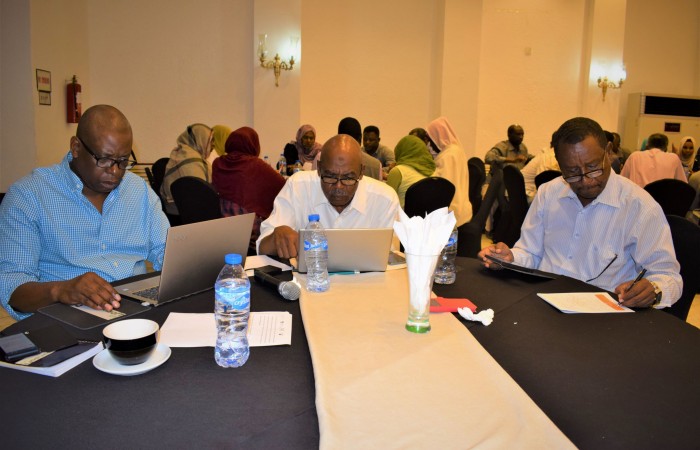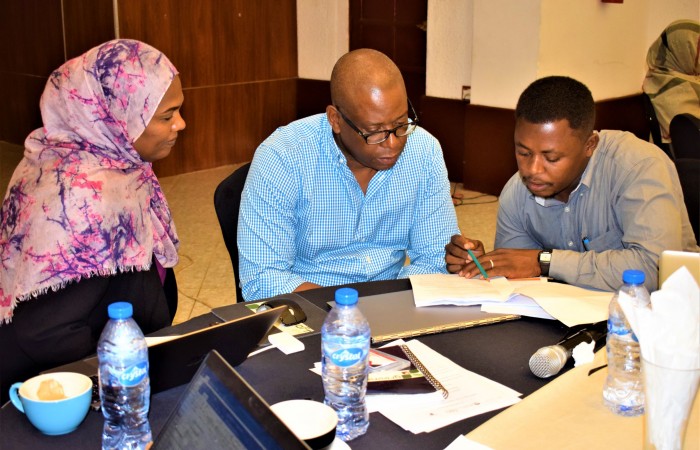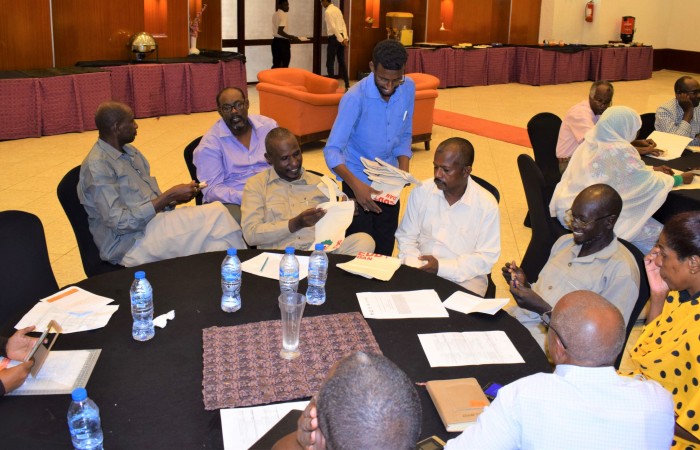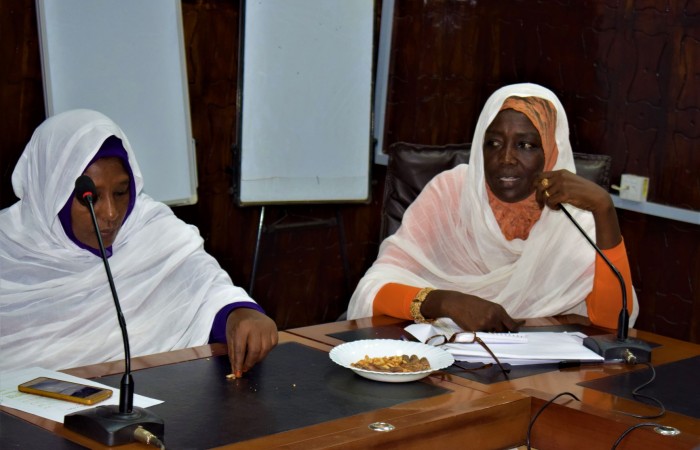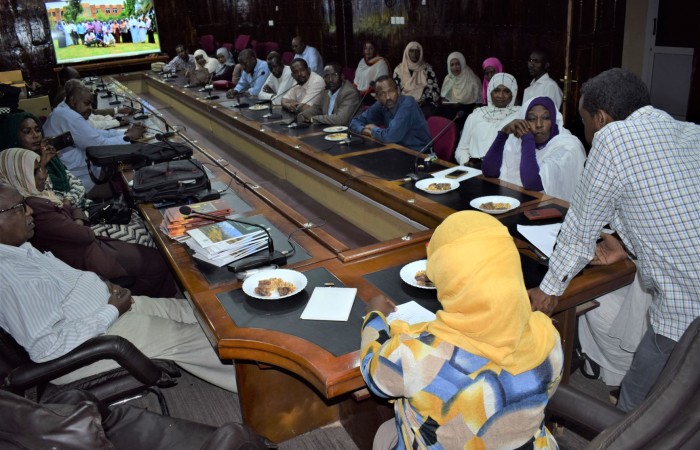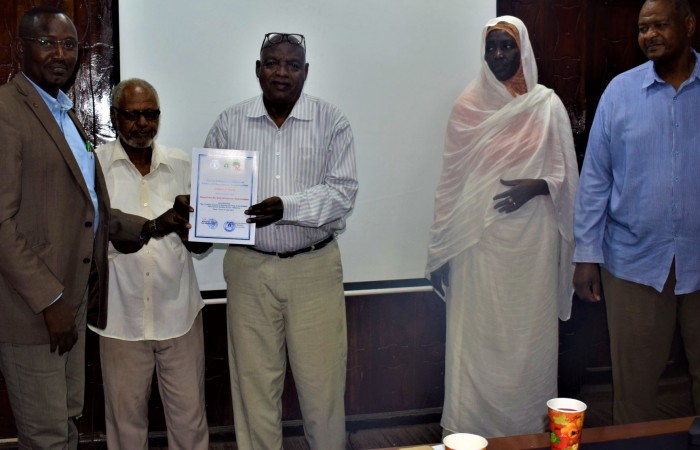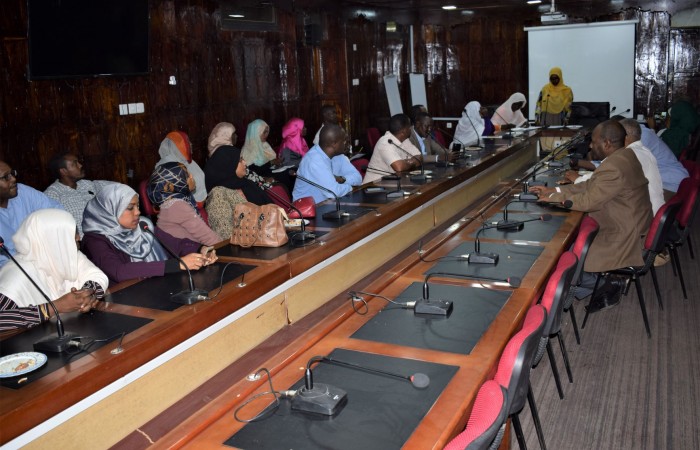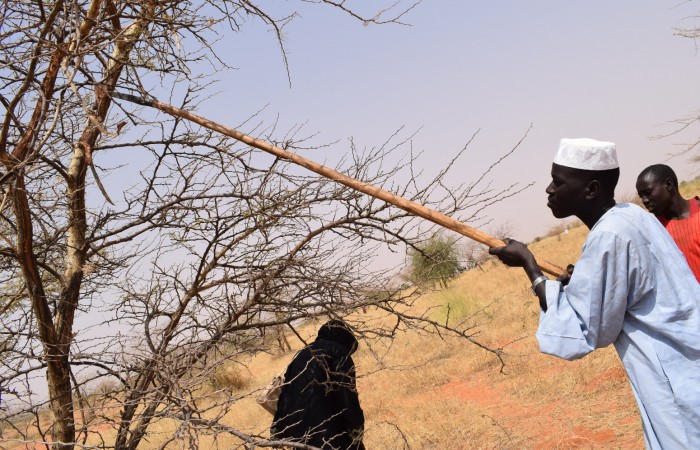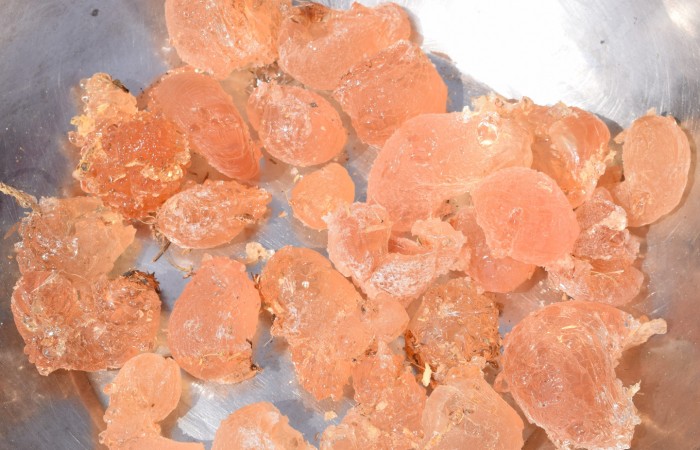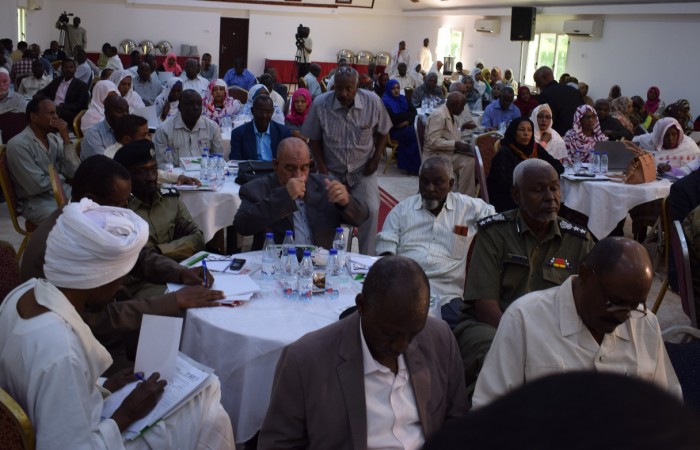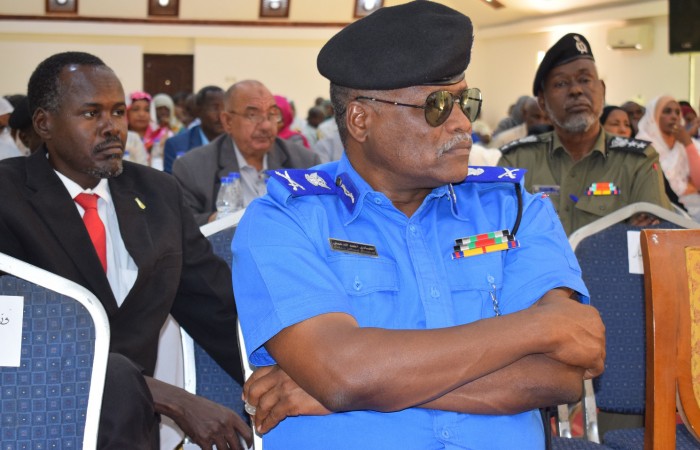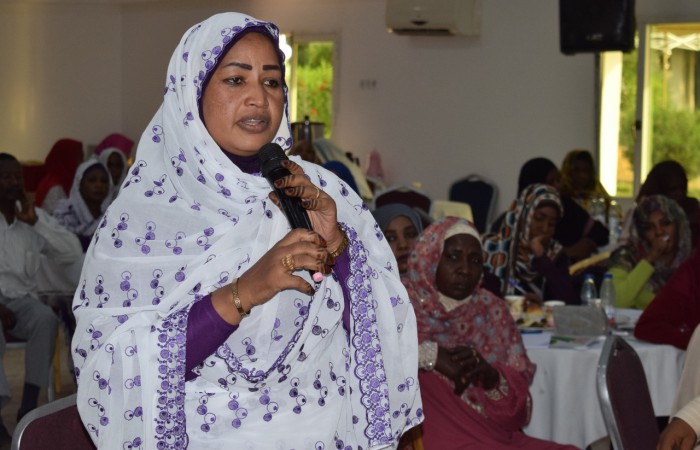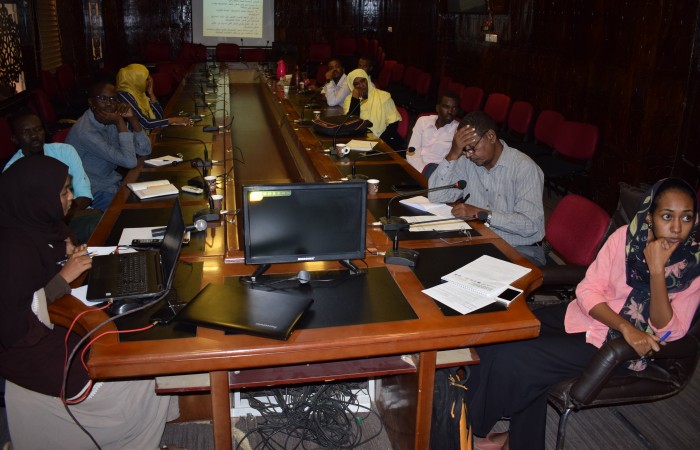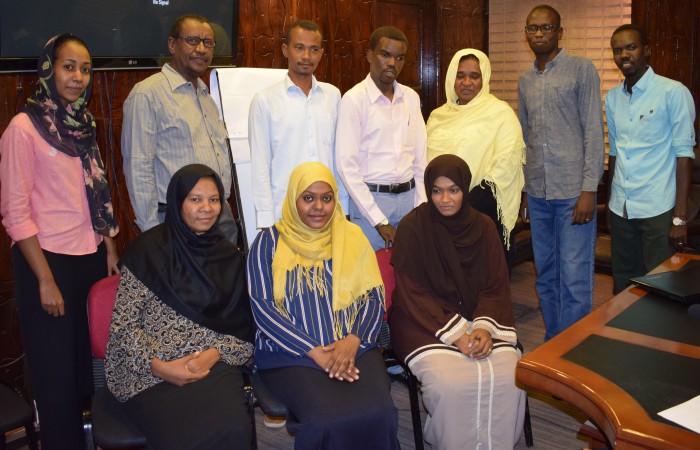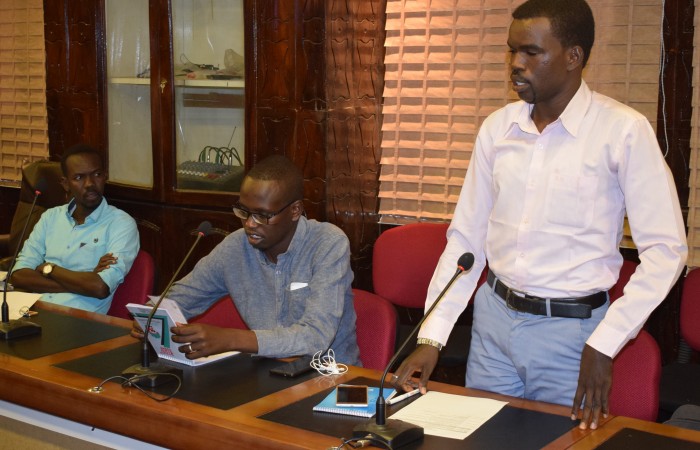The fifth Steering Committee Meeting of the REDD+
On 30 august 2020 members of the Steering Committee of the REDD+ Program convened the The fifth Meeting of the committee at the Gum Arabic Hall, Forests National Corporation (FNC) In Khartoum. The Meeting was attended by 18 participants.
The agenda for the Steering Committee meeting was:
Welcome and introductory speeches
Presentation of REDD+ program (The progress of the program, Outlook of activities for the final quarter)
Sustainability of REDD+ program
Problems and difficulties.
Any Other Business
Opening remarks
The meeting was opened by the Minister of State at the Ministry of Agriculture also thanked The REDD+ team.
Dr. Mohammed Ali Elhadi The Director-general of the forests national cooperation explained The role of the REDD+ program for development the forests issues.
The next points of the agenda:
The members of Steering Committee Approved the minutes of the 4th Steering Committee Meeting.
The chair of steering committee introduced the agenda for the fifth Steering Committee meeting The agenda was then adopted by all present.
The discussion moved to the presentation:
Dr. Sayeda Khalil as the coordinator of the REDD on behalf of the REDD+ Team presented the progress of the program and she clarified the activities for the final quarter.
Recommendations:
Renew REDD+ Steering Committee Members
Increasing Tree cover outside and Inside Forest Areas
Commitment to hold the meeting on time.
Any Other Business
Steering Committee agreed to hold its next meeting in end of 2020
Riverine Workshop
In the framework of the general policy of reducing emissions from deforestation and forest degradation on Riverine forests, the Riverine Workshop was held in Sennar state on 4 March 2020. The general aim of the workshop was to identify the current state of the Riverine forests and its ecosystem, and their role in mitigating climatic change and to highlight the environmental and societal importance. The workshop was characterized by significant participation from wide sectors with a total of 118 participants (63 female and 80 male). The participants represented relevant authorities that are directly and indirectly linked with the Riverine forests ecosystems.
Green Twons programme ,Tendality , White Nile State
An Urban afforestation workshop has taken place successfully in the White Nile State in the city of Tendlati which is a small town in White Nile State, Central Sudan. Tendelti is an administrative Locality in the White Nile State and it is on the borders Between White Nile State and Northern Kordofan State The workshop was held on February 19, 2020, The main goal of the workshop was raising awareness of the importance of Urban afforestation
The specific objectives of the workshop was to address topics of Urban afforestation as following
Highlighting the impact of changing climate change and the role of trees in combating global warming
Highlighting the role of associations, producers and local communities in afforestation in the city of Tendelti and The importance of trees to the lives of small-scale farming households in Tendlti
Coordination between the relevant executive, technical and academic bodies for the purpose of protecting and developing Gum Arabic trees.
Increased investment of urban afforestation
Workshop participants:
One hundred and sixty six (166) participants from the relevant authorities ,The participants were mainly farmers, community opinion leaders (traditional rulers, Unit Committees members, heads of Gum Arabic associations),as well as staff of Forest Division of the Forestry Commission, The participants showed keen interest in the Urban afforestation
Presentation
The workshop facilitated knowledge acquisition in participating communities for reducing emissions from deforestation and forest degradation. and enabled participants, mainly local communities to understand climate change, its impacts and the urgency of solving deforestation and forest degradation menace. They gained understanding of what REDD+ Is and Appreciated potential benefits, opportunities and risks of forest protection and REDD+ initiatives. The participants were appreciative of the workshop and expressed their desireto share the knowledge gained with other farmers in their respective communities.
Recommendations
Creating livelihood improvement activities using a community participatory method at the locality level thereby contributing to the improvement of the local socio-economic situation
Activating the self-help to start the afforestation process
Attention to school gardens, productive housing and fruit trees
Creating healthy environment for life throw Urban afforestation
Continuing forums, meetings and workshops related to the environment
Raising environmental awareness and disseminate the culture of afforestation and training
Strengthening Civil Society-Private Sector Partnerships
Activating the forest laws and policies
Increasing Green Cover in the State
Strengthening role of communities in the Forest Management to Forest Conservation
Private Sector Engagement in REDD+ Processes for Sudan’s REDD+ Program ,Validation Workshop
A workshop entitled ‘Private Sector Engagement in REDD+ Processes for Sudan’s REDD+ Program’ was organized in 18 December 2019 by the REDD+ PMU
An overall objective of the Workshop: This workshop was intended as a validation workshop for the study of "Private Sector Engagement in REDD+ Processes for Sudan’s REDD+ Programme" undertaken under the REDD+ Sudan
The specific objectives of the workshop were as follows:
- Sharing the study and its results with the project stakeholders;
- Validation of the study;
- Providing a platform for the discussion of private sector engagement in REDD+ processes for Sudan’s REDD+ program issues;
- Soliciting and generating recommendations that are likely to help the REDD + Project to engage the Sudanese private sector in the REDD+ processes in Sudan.
Participants : The Workshop was attended by 46 persons ; out of whom 60.9% were males and 39.1% were females comprise participants from the different bodies and a wide spectrum of representation including staff of Forests National Corporation (FNC); Educational Institutions; Private sector (Industry, Commerce; Banks), Related Ministries (Ministries of Agriculture and Natural Resources, Minerals, Oil and Gas, Range Administration; Department of Wildlife); SESA; Remote Sensing Authority (RSA); World Bank (WB) and Gum Arabic Producers’ Association.
The Presentation: The study was presented by the Consultant Miss. Renuka Srinivasan on behalf of UNIQUE Forestry and Land use, highlighting the potential role of the Sudanese private sector engagement in REDD+ processes for Sudan REDD+ Programme.
Reflection from the workshop participants
- a) No mention was given concerning the methodology of the study.
- b) Land tenure is a major problem in the R o S. This situation is not encouraging for the private sector. A good alternative for the private sector is to work jointly with the FNC, as there is no problem of land tenure.
- c) The new forest policy encourages investment in forestry; private sector can establish joint projects with the FNC.
- d) Taungya system, which was recommended by the study, has been adopted by the FNC since long ago. The system allocates reserved deforested areas to local community members to plant agricultural crops along with forest trees. After success of the tree planting the farmers leave the area to new areas allotted to them by the forestry authorities.
- e) The 22nd. Forestry Congress held by the FNC in Khartoum in 2017 emphasized the role that private sector can play in afforestation activities, especially in urban forestry (e.g. the Golf field in Khartoum State).
- f) Some participants mentioned that Khartoum State is not one of the hot spot areas. Hotspot areas have already been determined in previous REDD+ studies.
- g) Unlike other investment areas, no one has tried to prepare a feasibility study in the field of forestry.
- h) Additional energy alternatives can be proposed in addition to what was mentioned about LPG and improved stoves. Solar energy and wind energy can be good alternatives.
- i) The private sector can invest in bio-gas, as the raw material is available everywhere. Local communities can be trained to produce their own bio-gas. This will reduce the pressure on the forest areas and save hard currency through reducing LPG export
- j) Encourage local communities through appropriate technology: tapping tools for Gum production and developing tools suitable to other non-wood producing trees and shrubs. Private sector can be encouraged to invest in planting non-wood producing trees as a base for some forest industries.
- k) There is need to establish forestry-private sector discussions to make the private sector acquainted with investment opportunities in forestry.
- l) There are some opportunities which were not noted in the consultancy, e.g. pulp and paper industry, production of volatile oils, etc. These and others might be attractive to the private sector.
- m) All developmental projects should include the environmental impact of the project and compensation should be made in the form of tree planting among other compensations
لبنك الدولى وبرنامج خفض الانبعاثات الناتجة عن إزالة وتدهور الغابات ومشروع الإدارة المستدامة للموارد الطبيعية يعلنون انطلاق مسابقة السودان للصور من ضمن فعاليات الاحتفال باليوم العالمى للجفاف والتصحر
لمعرفة تفاصيل وشروط الاشتراك في المسابقة اتبع الرابط أدناه (عربى + انجليزى)
آخر موعد للمشاركة فى المسابقة ٣١ يوليو ٢٠٢٠
: https://drive.google.com/…/1nXYzG-eIQYju3txkywPHuGMatk…/view
[https://drive.google.com/…/1TTUVAZO8mr_90KBAgziA_BRQvD…/view](https://drive.google.com/…/1TTUVAZO8mr_90KBAgziA_BRQvD…/view
World Bank Mission November, 2019
From November 16 to 22, 2019, a World Bank carried out the implementation support mission of the Reducing Emission from Deforestation and Forest Degradation (REDD+) programme in Sudan.
The Scope of the mission focused on two aspects:
Submission and how Execution the Plan for the next year
Reviewing achievements from September 2018 to November 2019
The objectives of the mission were to carry out a quick assessment of the programme’s performance in terms of the achievement of objectives and results.
It also reviewed some issues in relation to the disbursement of the Supplementary financing had approved.
The mission team conducted a lot of discussions with all the REDD staff PMU , focal points in all states of Sudan , some discussions with consultancies and
Discussions with FAO- on REDD+ activities implemented by FAO (FEEL, MRV )
The mission Schedule included multiple meetings and visits, As a starting point the mission team Visiting the REDD+ program unit in FNC and conducted Meeting with FNC Director General, meeting with the new Minister of Agriculture and Forests and meeting with ministry of Finance /DG of Foreign finance.
The programme within the mission days contained several presentations addressed many issues such as general progress of the Sudan REDD+ Programme , Financial and disbursement Management , procurement, communications, Mangroof in Red Sea State , focal points activities , Besides Some presentations from Core consultancy under the REDD+ Readiness as Private sector Strategy, SESC Gender mainstreaming Strategy, SESA Strategy (phase 2), A GHG Inventory and Reporting , Saw Sudan organization introduced presentation on REDD+ : Lesson learn from Sudan Round Trees Networking Initiative, Joint Review with FAO- on FAO Led program activities (FREL, MRV )
World Bank country director held a wrap-up meeting with the members of mission and some representatives of the World Bank in the offices of the World Bank in Khartoum on Thursday as well the ministry of finance wrapped up the mission by another meeting .
In conclusion, the TTL expressed his satisfaction with the project performance so far and she declared Continuation to provide support to successful of implementation of all activities planned under this project.
The members of mission
The mission was led by Ms. Dora Nsuwa Cudjoe (Senior Environmental Specialist, Task Team Leader) and included, Mr. Alemayehu Belay Zeleke (Environmental Specialist) and others representatives from world bank Khartoum office
Stronger institutional capacities for better forest monitoring and planning in Sudan, Workshops for SFMS Institutional Capacity Needs and Gaps Assessment
To facilitate the formulation of the National Forest Monitoring System (NFMS) Action Plan in Sudan, a two-day consultation workshop was organized in Khartoum, Sudan on 6 - 7 October 2019 at the Grand Holiday Villa Hotel. Attended by the implementing partners as well as other project stakeholders such as the Ministry of Agriculture and Natural Resources, the Ministry of Environment, the Ministry of Livestock, the Ministry of Wildlife, as well as academia and the private sector, the event offered 60 participants a platform to exchange information and experiences related to national forest inventory (NFI) implementation, the use of forest data for national plans and strategies, and program sustainability and institutionalization. The workshop was the beginning of an important process as REDD+ and forestry monitoring experts from Khartoum and various Sudanese States came together to identify the critical institutional capacity needs to ensure the country is able to meet its requirements for evidence-based policy formulation and international reporting obligations.
In his opening remarks, FAO Representative to Sudan Mr Babagana Ahmadu, highlighted the importance of the event and its topic to Sudan’s climate commitments: “Understanding that climate change is one of the defining challenges and risks of our generation and global efforts to address these challenges require a multi-pronged approach – one of our focus is to strengthen institutional capacity,” stated Mr Ahmadu. “Having adequate national forest monitoring system capacity, and well-resourced institutions, and technically competent staff will enable Sudan achieve its REDD+ goals contributing to the overall economic development across all sectors.”
This workshop is very important for Sudan to develop the national forest monitoring system. Participants representing all the states in Sudan, who participated in the NFI activities as well as NGOs and academia have contributed to the national priorities and provided insight into the capacity needs assessment,” said Sayeda Adam, REDD+ coordinator at FNC. “The knowledge gained from this workshop will support decision makers on land and forest sector focused decisions as well as increase the capacity of staff of the National Forestry Corporation.”
Nelson Gapare, FAO consultant supporting the institutional capacity needs and gap assessment for NFMS and MRV reflected on the next steps: “Following this national workshop, the government of Sudan will start formulating its NFMS Action Plan outlining how it will address any identified institutional capacity needs and gaps. The development of an action plan is an important step towards strategizing about how to finance the short, medium and long-term requirements to meet national and international climate change reporting requirements – for instance – obligations under the UNFCCC and Paris Agreement. The gradual development of the NFMS and relevant MRV functions will be fundamentally important as Sudan embarks on new economic policies across all sectors including agriculture and forestry”.
Looking at Sudan’s forests from above
Separate parallel training sessions on remote sensing were held during the workshops, allowing the participants from Forests National Corporation, the Remote Sensing & Seismology Authority and research institutions to have better access to precise and timely data and support Sudan in combating deforestation to help meet national and international climate targets. Remote sensing technologies, which includes sensors, processing software and analysis, has been extensively studied and applied in Sudan in various sectors including Agriculture, Forestry, and Other Land Use (AFOLU). Studies that employed remote sensing have improved understanding of the state of Sudan’s forests. At the strategic level of forest planning, or in general planning for forest resource allocation over a wide area, remote sensing can play an important role in estimating and monitoring forest cover.
Training workshop on the monitoring and mapping of forest fires
Fire management workshop was held in forests National Corporation Sahel Center during the period 7-12/ 9 / 2019 within the framework of the Sudan forest management. Fire Mapping for Sustainable Development
Workshop Duration: Six days
Main aim of this workshop was to build and raise capacities in the management and monitoring of forest and prairie fires
The workshop was characterized by significant participation from wide sectors with a total of 15 participants (9 women and 6 men) nine forests and six from the relevant authorities Including National expert on wildfires, Sudanese National Remote Sensing Authority , Universities (Kordofan University College of Forestry and Pasture (,General Administration of Civil Defense, General Administration of Wildlife, Meteorological Authority , Focal point of fires , Gums Administration , REDD + program , Range & Pasture Administration,
Topics of the Workshop included the follows
Introduction: What are forest fires and their effects? To prevent fire want needed and what available.
The uses of remote sensing to manage fire , Forest fire analysis with remote sensing data.
How to make Vegetation Index.
Forest fire mapping.
MODIS image interpretation and analysis
How to use vector system
Gum belt Workshop, El-Obeid-North Kordofan State , February 7-8, 2019
The gumbelt workshop was held in Al-Obeid, the capital of North Kordofan State in February 7-8, 2019 within the framework of the overall program of reduction of emissions from deforestation and forest degradation in Sudan. The gumbelt cover vast areas of central Sudan, and has significant environmental, economic and social values. The workshop focused on the contributing and driving factors to the rehabilitation in terms gum trees, other natural resources and the local communities. The emphasis was on gum Arabic producing trees (mainly Acacia senegal) due to their environmental and societal role, in addition to their contribution in the efforts to mitigate climate change. The main objectives were:
- Highlight the contribution of the gumbelt in the mitigation of climate change, reducing emissions, economic values and social importance.
- Engage and mobilize gum Arabic producers and associations in the rehabilitation of the efforts within the framework of exchanging and promoting benefits.
- Strength the roles of executive, civil society leaders and the civil societies; and to create partnerships between the official and the community towards protection and sustainable management of the gumbelt.
- Coordinate efforts of the executive, technical and academic bodies related to the purpose of protecting and rehabilitation of the belt by monitoring, surveying, identifying of sustainable management options and meeting the challenges.
The workshop was attended by a significant number of participants (153: 49 women and 104 men), representing stakeholders, executive entities and civil leaders. They contributed by attending, presentations and active involvement in the discussion and the workshop activities. The workshop was honored by the attention and the speech presented by the Governor of North Kordofan State, and characterized by a large representation of the executive leaderships, director general and directors of the Forests National Corporation, a number of researchers from the Universities and the Agricultural Research Commission, as well as representatives of the civil bodies and producers of gum Arabic, in addition to the media .
Workshop program and side events
Day 1: Thursday February 7th, 2019
- Inaugural session honored by the Governor of North Kordofan State
- Scientific and technical working sessions and recommendations
|
Opening program |
|||||
|
The Holly Quran by Balla Musa |
8:30 – 8.35 am |
||||
|
Director of North Kordofan State forests: Mohamedain Elamin Mohamedain |
8:35 -8:40 am |
||||
|
Director General of the Forest National Corporation: Dr. Mohamed Ali El Hadi |
8:40 – 8:50 am |
||||
|
Minister of the Ministry of Production and economic resources-North Kordofan: Dr. Mohamed Hamed Suleiman al-Daw |
8:50 -9:00 am |
||||
|
Governor of North Kordofan State: Governor Ahmed Mohammed Haroun |
|
||||
|
Break |
9:00 – 9:30 am |
||||
|
First working session Moderator Dr. Mohammed Hamid – Dean of the Institute of Gum Arabic Research University of Kordofan |
|||||
|
Presesnter |
Title |
Time |
|||
|
Mr. Buri Bella Al Hussein |
The emission reduction program and the role of gumbelt in reducing emissions, its economic importance and international experiences |
10:20 – 10:40 am |
|||
|
Redd+ Technical advisor |
Natural Resources in North Kordofan State |
10:40 – 10:50 am |
|||
|
Mr. A. Tariq al-Amin: Director of Agriculture and Natural Resources, North Kordofan |
1)Experience of North Kordofan State in the rehabilitation of gumbelt |
10:50 – 11:10 |
|||
|
1.Mr. Masoud Mohammed Masoud – Coordinater of Gumbelt rehabilitation project. |
2)the State Strategy for the rehabilitation". |
11:10 -11:30 am |
|||
|
2. Mohammedain Alamin Mohammedain, Director of North Kordofan Forests |
|
11:30 am - 12:30 pm |
|||
|
1.Ms.Fatima Mohammad Ahmed Ramli - Director of Gums Department And 2.Hamdan Kabashi: representative of gum Arabic producers and associations |
1)The Role of producers of gum Arabic associations in the rehabilitation of gumbelt 2) the reality and future vision of producers to adapt through the emission reduction program |
12:30 – 1.00 |
|||
|
Discussion |
11:30 am - 12:30 pm |
||||
|
Break |
12:30 – 1.00 |
||||
|
Second working session Moderator: Masood Mohammed Masoud Coordinator of the Gum Arabic Belt rehabilitation project |
|||||
|
Presenter |
Title |
Time |
|||
|
Mr. Mohamed Moussa – North Kordofan legislative Council |
Political and legislative authority for the emission reduction Program |
1.00 1.20 pm |
|||
|
Mr. Madeni Ismail – Researcher, Al-Obeid Research Station |
Role of research in the development of the gumbelt in light of climatic changes |
1:20 – 1.40 |
|||
|
Mr. Mohamed Idris Ibrahim- Director of the support projects for restricting of gum Arabic sector. |
Lessons Learned from projects operating in North Kordofan State in the involvement of communities and the private sector in marketing and value chain" |
1:40 -2:00 pm |
|||
|
Discussion and Recommendations |
2:00 -4.00 pm |
||||
Day 2: Friday February 8th, 2019: Field visits to Gum belt rehabilitation sites in North Kordofan State.
Day 3: Saturday February 10th, 2019: Departure of participants
Workshop Recommendations
- To intensify the rehabilitation efforts and activities by the Forests National Corporation, other formal sectors and the farmers in gum Arabic producing states by enhancing regeneration using seeds and seedlings, and strengthen the procedures of protection from illegal felling of trees, grazing and fire.
- To encourage and strengthen the participation of youth, woman and the private sector in protection, regeneration operations and production of gum Arabic.
- To expand extension and guidance efforts and messages for farmers and gum producers at all stages of production from tapping of all of the productive trees and gum Arabic collection, storage and marketing.
- To strengthen the capacities of producers, associations and communities to increase production and achieve a rewarding return by contracting systems, and to provide financial aids to increase production and to open up prospects and opportunities for local marketing (such as Al-Obeid stock exchange) and foreign markets.
- To improve and intensify developmental research and introduction of intermediate technology on regeneration, methods of gum production, marketing, and alternative uses of gum products.
- To provide basic and supportive services for the forest and farming communities in the gum belt as an integral part to the production of gum Arabic and the rehabilitation efforts of gum Arabic belt.
- To expand the value chains of agricultural and animal products and enhance their benefits among stakeholders by leveraging the various projects and programs for the forest farming communities in the gum producing states
The mangrove workshop and the accompanying programs were held in the city of Port-Sudan, Red Sea State - Sudan during the period 21-24 January 2019. The general aim of the workshop was to identify the current state of the Mangrove trees and its ecosystem on Sudan Red Sea coastal areas, their role in mitigating climatic change and to highlight their environmental and societal importance according to the following objectives:
- To highlight the importance of mangrove forests and their ecosystems within the framework of reducing carbon emission
- To raise awareness of mangrove forests environmental, social and economic values.
- To strengthen the role of the executives and civil society organizations, and to create partnerships between the formal authorities and the communities in the management and protection activities.
- To address the challenges by enhancing coordination among the relevant executive, technical and academic units for conservation and development of mangrove ecosystems by regular inventories and identification of sustainable management methodologies.
The workshop was characterized by significant participation from wide sectors with a total of 156 participants (52 women and 104 men). The participants represented authorities that are directly and indirectly linked with the Mangrove ecosystems. They included significant representation of executive leaders in the Red Sea State headed the Governor, Deputy Director of the Forest National Corporation (FNC), President of the Red Sea University, representatives of the municipal authorities (mayors) and civil societies, in addition to the media
Workshop program and side events
Day 1: Tuesday, January 10th, 2019 at al Rabwah Tourist Hotel (annexed program)
- Opening session attended and patronage by the Red Sea Governor.
- Scientific and technical working sessions and recommendations.
Day 2: Wednesday, Jan 23th, 2019
- Field visits to mangrove forests and ecosystems.
Day 3: Thursday Jan 24th 2019
- Field visits to coastal and mountainous ecosystems in the Red Sea state.
Day 4: Friday Jan 25th, 2019
- Departure of participants from Port Sudan
Workshop Recommendations
- Inventory and monitoring of mangrove forests for sustainable management, development and expansion along the Red Sea Coast.
- Legalize the status of the mangrove forest as natural reserve or reserved forests at the national or state level and supervised by a beneficiary mechanism under the technical supervision of the FNC.
- Make use of previous lessons and international experiences, in addition to possible introduction of economically viable new mangrove species.
- Provide support for research and scientific studies in the fields of propagation, regeneration and economic and environmental benefits.
- Raising awareness of local communities, official and private entities about the environmental and economic values of mangrove forests.
- Training of workers and local communities in the management aspects of mangrove forests through demonstration visits, past experiences and studies.
7. Establishment of a forestry program or forest department in the Red Sea state and in coordination with other formal sectors like the naval forces in the conservation of mangrove forests and biodiversity in general
More...
In line with REDD+ program organizational set up and Governance requirement the periodic steering committee meeting NO (4) was held on January 17th 2019.
The meeting was headed by The State Minister of Agriculture and Forestry, co-headed by the DG of Forest National Corporation and attended by 23 participants representing different stakeholders.
The meeting included the following:-
- Brief Note by his Excellency Minister of Agriculture.
- Brief Note by the DG of FNC.
- Presentation on REDD+ program and the key hot issues by National REDD+ program Coordinator.
- Discussion on the last Meeting Notes and the progress made so far.
The Readiness Assessment Package (R-Package) is a major milestone and comes at the transition stage from REDD+ readiness preparation to piloting performance-based activities. The R-Package is an important requirement by the FCPF for assessing progress, strengths and weaknesses, and seeking objective feedback from relevant national and sub-national stakeholders involved in Sudan’s REDD+ process. Sudan is preparing its R-Package at an advanced stage of its readiness preparation to benefit from the outcomes and feedback of the self-assessment to improve and consolidate its readiness preparation. The implementation of Sudan’s readiness program is scheduled to be completed by December 2019, in line to the additional grant agreement.
The objectives of R-Package study
- To synthesize and consolidate the findings of analytical studies carried out during the readiness preparation process
- To assess progress made by Sudan on REDD+ Readiness through multi-stakeholder consultation workshops at district, national and regional levels;
- To prepare an R-Package report on the basis of criteria and diagnostic questions in the R-Package Assessment Framework
- Results of assessment of progress made the readiness preparation;
- Results of the national multi-stakeholder self-assessment;
- Insights on significant achievements made and lessons learned in all sub-components;
- Identification of remaining gaps and areas that require further development in all sub-components;
- Next steps and planned activities for transitioning to the implementation phase
The self-assessment process
The self-assessment process was conducted during the period 23 December 2018 to 7 January 2019. In total, 74 representatives of nine stakeholder groups have participated in self-assessment process, of which 43 percent are women. Participants include PMU staff, state focal points, members of the Technical Advisory Committee, the Steering Committee, and the Technical Working Groups, as well as representatives from 10 civil society organizations and two development partners .
Table below presents the stakeholders groups that participated in Sudan’s REDD+ readiness self-assessment and the sub-components that each group considered
Stakeholder groups that participated in the readiness self-assessment
|
Stakeholder group |
No. of representatives |
Gender |
Readiness sub-components |
|
|
|
|
Women |
Men |
|
|
Programme Management Unit |
8 |
4 |
4 |
All sub-components |
|
States Focal Points |
21 |
5 |
16 |
All sub-components |
|
Technical Multi-Sector Advisory Committee |
3 |
1 |
2 |
Sub-component 2 |
|
National REDD+ Steering Committee |
9 |
4 |
5 |
Sub-component 2 |
|
Technical Working Groups |
20 |
11 |
9 |
Sub-components 2, 3 and 4 |
|
Civil Society organizations forums |
11 |
6 |
5 |
Sub-component 1.B |
|
Development Partners |
2 |
1 |
1 |
Sub-components 1.A, 3 and 4 |
|
Total |
74 |
32 |
42 |
|
Five sessions have been organized for the different stakeholder groups to perform their self-assessment of Sudan’s REDD+ readiness program. The self-assessments by the development partner were solicited through a dedicated form which was sent to relevant representatives of the World Bank and FAO, respectively. The objective of the self-assessment sessions was to provide a platform for consideration and discussions among the stakeholder on the progress made to date across all the sub-components of the readiness proposal against the FCPF RAF assessment criteria. The organization of the sessions included the following:
- A presentation on the progress made to date on the implementation of the readiness activities as described in the FCPF two grant agreements to ensure that all stakeholder groups are fully aware of all readiness activities, including in other components outside their mandate.
- A presentation on the self-assessment process which explained the context, the rationale, the objectives, advantages, methodologies and expected results.
- A dedicated form was provided to the participating stakeholders to write down the results of the self-assessment. The form is based on the criteria and diagnostic questions in the RAF, and provides space for scoring against the assessment criteria using color coded score ranges for each of the progress indicators (traffic lights). These codes range from 0-100, where each of the range represents a specific color. A score ranging 100-81 is represented in green, 80-51 is represented in yellow, 50-21 is represented in orange, and 20-0 is depicted in red. The score ranges are qualitative and enable aggregation of results across the stakeholder groups. The form also provides space for noting significant achievements and lessons learned, as well as gaps and issues the require further Development.
- Stakeholders were divided into breakout groups (e.g. state focal points) or worked as one group, according to the size of the groups or their mandate in the readiness implementation. Each group was asked to assign a chair to steer the discussions and a rapporteur to report the results of the self-assessment of its group.
- Diagnostic questions have been translated and explained by the consultant during the self-assessment session. Additional clarifications were provided during the self-assessment session upon requests from the stakeholders. Clarifications were mostly sought due to the fact the some questions suggesting readiness systems, such as the benefit-sharing mechanism, the ESMF and the FGRM are fully operational and are already being tested in the REDD+ implementation phase which is not true in the case of Sudan.. Therefore, the stakeholders were asked to also take into consideration the readiness activities that are planned to be completed by the end of the additional grant agreement (December 2019). For this reason, a presentation on the progress made in the implementation of the two grant agreements was necessary to inform the stakeholders on all the readiness activities that will be implemented in Sudan’s readiness program until December 2019.
- The guidance provided by the consultant and followed by the stakeholders in their self-assessment was to start by discussing the progress based on the diagnostic questions provided for each criterion – normally 1-3 questions per criteria – and to build a common understanding on whether the progress made meets these criteria. Then, the group collectively agreed on a single score using the scoring ranges and provided its feedback on significant achievements made, lesson learned, gaps and issues that require further development within or beyond the remaining time of Sudan’s readiness program implementation (December 2019) in bullet format.
- The outcomes of the self-assessment by the different stakeholder groups have been collected, combined and analyzed.
Internship Program
PMU of REDD+ program organized a meeting with the researchers under internship Program at 28 November 2018 in gum Arabic hall, Forests National Corporation. It was attended by researchers (6) and PMU of REDD+
The purpose of the meeting
- Introduce presentations on the Progress made in the researches.
- Exchange ideas amongst the researchers to maintain complementarity.
- Help researchers to overcome any difficulties they are facing.
The contents of the meeting
The meeting included six presentations
- Quantifying the changes of land use/cover on Forest Cover in Cerro Forest, Sennar State.
- The impact of tree belts on agricultural productivity in the state of Gedaref and the amount of biomass. the deterioration of Mangrove forests and their social and environmental impacts in the Red Sea state.
- Assessment of socio-economic characteristics of the local community and biophysical status of Kodroka and Kasinger forests in Northern State, Sudan.
- Assessment of Forests resource Degradation in Central Darfur state , study case Um Aroog Natural forest.
- Quantification of Drivers.
The outputs of the meeting
- The researchers received the comments from the audiences.
- There was a very clear Complementarity amongst the researches and very rich information.
- The researches cover diverse issues and different area in Sudan.
- Researchers have been oriented about the regional workshops which planned to start by the eastern region (Mangrove forests).
Workshop on Wildfire Management and Monitoring in Sudan October, 30, 2018
The workshop were aimed to identify the status of existing knowledge related to wildfire of the Sudan; discuss the different programmes of wildfires management, and appropriate network relationships to support such programmes .
42 participants attended the workshop representing various Government entities (including REDD+ Focal Points of States in the hotspot areas), NGOs, academia, research institutes and journalists
Opening remarks were made by 3 speakers are
Dr. Syada. Khalil, Coordinator of the Sudan REDD+ program
Mr. Matthias Lichtenberger, Chief Technical Advisor
Mr. Osman Omar, representative of the Director-General, Forests National Corporation (FNC)
4 papers were presented at this workshop that covered topics such as Wildfire monitoring in Sudan , Remote Sensing , Fire Management, Forests and Fire
These papers were presented by
Mr. Peter Moore, Forest Officer
Dr. Mohammed Al-Jamri Atta Al-Mannan Assistant Professor, Faculty of Forestry and Range Science- Sudan University
Dr. Muhanad behalf of Dr. Solafa Babiker, Director, Remote Sensing and Seismology Authority
Rasha Abdalla Fadul Abdalla, Focal Point for Forest Fires; FNC
Summary of discussions
The number of participants in the discussion reached 17, addressing a number of hot issues related to forest fires.
The outcome of the workshop was 13 recommendations as follows
Lack of sharing of data between different institutions
Lack of collaboration and meager capacity in firefighting
Networking and linkages
Revisit the forest extension system to accommodate the new trends in forest protection
Revisit the protection system of FNC
Conducting of workshops in the states for better sharing and involvement of stakeholders
Collaboration with neighboring countries for knowledge and experience
Up-scaling of success stories like Jabal Marra experience with GTZ project
Revisit the native administration as local management mechanism
Human and financial resources support for the new born fire control unit of FNC.
Involvement of academia and research in developing effective models for firefighting and to have good networking with private sector
Awareness raising for different stakeholders
 English
English العربية
العربية 
